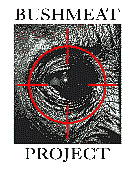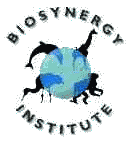THE NEW CONSERVATION AGENDA
Conservationists now recognize that consumption of wildlife as meat and medicine has grown into a global crisis. Scientists concerned about the great apes and other protected species are calling for a new wildlife conservation agenda suited to the vast and complex socio-economic scenarios of the bushmeat era. International and regional political and economic programs must be
linked with multi-purpose community-based conservation projects that create the human-nature biosynergy needed to reverse the destruction of wildlife. This means implementing policy and plans that empower and enable local people to protect, revere, and benefit from their natural heritage.
We believe immediate success will come to conservationists who work with people now involved in the wildlife commerce -- poachers and traders, suppliers and producers, exploiters and consumers. These proactive partnerships will invent alternative ways to satisfy the human needs that drive the unsustainable commercial extraction and consumption of wild animals. Having attained professional consensus that the global wildlife crisis is a top conservation priority, it is time to move from measuring and defining the problem to constructing and installing solutions.
These are our ten fundamental solution paths for conservation & development.
- Wildlife Crisis Campaign -- Conduct global and local campaigns to arouse public awareness of the wildlife crisis and related public health issues, encourage production of book and magazine materials as well as TV and cinema programs, and finance and organize locally developed radio and newsprint campaigns to encourage the people to discuss and develop positive means and ways to preserve their natural heritage and protect human health.
- International Wildlife Alliance -- Foster social change by organizing conservation groups, government agencies, and world health and financial institutions to collaborate to eliminate the exploding trade in commercial wildlife. Only by making the effective treatment of this pandemic conservation and health issue a requirement for international aid and assistance, will the needed changes occur.
- Biosynergy Management -- Develop and install mechanisms to monitor and maintain synergistic relationships among humans and wildlife in the widest possible range of natural habitat, beginning with territories where human exploitation threatens maximal ecosystem disruption and biodiversity reduction.
- Natural Resource Renewal -- Enable natural resource exploiters to establish bushmeat-free operations, develop effective wildlife protection and conservation education programs, provide legal sustainable consumer products for workers and commercial consumers, and integrate biosynergy monitoring and
management into their field operations.
- Wildlife Alternatives -- Underwrite and develop alternative protein sources, sustainable non-timber forest products, ecologically sound community farms, and bushmeat-free markets and restaurants in village, farm, and urban areas where domestic food and medicine alternatives are needed most to counter
the wildlife commerce.
- Wildlife Protection Teams -- Endow the institutionalization of permanent wildlife protection teams for established parks and reserves, as well as mobile units to work in resource extraction areas applying community-based preventive techniques, encouraging alternatives to bushmeat commerce, and
enforcing wildlife laws through effective interdiction and prosecution.
- Poachers-to-Protectors -- Set up projects to recruit, train and re-employ wildlife hunters as park guards, field assistants, census takers, teachers and tour guides. Immediate reduction of wildlife killing will come from in-situ projects that use hunters' skills and knowledge to support conservation.
- Mobile Wildlife Missions -- Establish mobile training and development projects to travel the religious missionary circuit and help pastors and priests implement wildlife missions to increase awareness of the economic, ecological, and health dangers of the wildlife trade, foster moral and humanistic concerns for living wildlife, and initiate community-based
conservation projects.
- Health Monitoring Systems -- Design and install methods to identify, analyze, monitor, prevent and treat interspecies viral and bacterial transmissions in territories where bushmeat hunting and commerce, animal pet and orphan caretaking, and other human contact with wildlife occurs.
- Wildlife Orphan Ambassadors -- Develop and implement innovative projects to seek and safeguard apes and other bushmeat orphans in hunting camps, homes, businesses, zoos, and sanctuaries and to employ them as an educational resource to engender positive conservation values in local people and communities across the regions where wildlife commerce is growing at dangerous rates.
|


